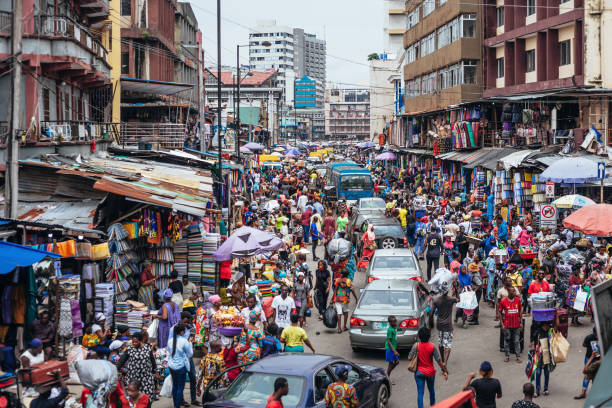
Nigeria missing as Benin Republic, Uganda make list of fastest-growing economies in Africa
Nigeria missing as Benin Republic, Uganda make list of fastest-growing economies in Africa
The International Monetary Fund (IMF) has excluded Nigeria from its latest list of Africa’s fastest-growing economies, naming Benin Republic, Côte d’Ivoire, Ethiopia, Rwanda, and Uganda among the continent’s top performers.
The IMF said the five nations are now ranked among the world’s fastest-expanding economies, driven by sustained policy reforms, fiscal prudence, and strategic investments in infrastructure and manufacturing.
Director of the IMF’s African Department, Abebe Selassie, announced this in Washington, D.C., during the launch of Sub-Saharan Africa’s Regional Economic Outlook.
Selassie noted that Sub-Saharan Africa’s economic growth is projected to hold steady at 4.1 per cent in 2025, with a modest uptick expected in 2026, supported by continued reform momentum and macroeconomic stability in several key economies.
“Several countries in the region — Benin, Côte d’Ivoire, Ethiopia, Rwanda, and Uganda — are among the fastest-growing economies in the world,” Selassie said.
“This reflects the impact of macroeconomic stabilisation and reform efforts across major economies in Sub-Saharan Africa.”
Despite Nigeria’s absence from the top list, the IMF recently raised its growth forecast for the country, projecting a 3.9 per cent expansion in 2025—a 0.5 percentage point increase from its previous estimate—citing higher oil output, improved investor confidence, and a more supportive fiscal environment.
The National Bureau of Statistics (NBS) also reported a 4.23 per cent GDP growth in the second quarter of 2025, up from 3.48 per cent in the same period last year, reflecting gains in oil production and non-oil sector recovery.
However, the IMF said the pace remains below potential, urging Nigeria to deepen structural reforms, boost power supply, curb inflation, and diversify its revenue base.
Debt and financial stability concerns
The IMF raised concerns over rising financial vulnerabilities across the region, warning that governments’ increasing reliance on domestic bank borrowing poses a growing threat to financial stability.
Selassie explained that as external financing tightens, many governments have turned to local banks to fund public spending — a “double-edged sword” that strengthens short-term resilience but heightens long-term risks.
“About half of public debt in Sub-Saharan Africa is now held by domestic financial institutions,” he said.
“This trend increases exposure between governments and banks, particularly in countries with high debt and interest rates.”
He called on African governments to strengthen bank regulation, enhance capital buffers, and ensure that public finances remain on a sustainable path to prevent spillover risks.
Policy priorities for sustained growth
The IMF outlined two broad policy priorities for African countries — domestic revenue mobilisation and debt management transparency.
It urged governments to modernise tax systems through digitalisation, reduce inefficient tax waivers, and improve enforcement, while also publishing comprehensive debt data and strengthening budget oversight.
“These reforms must build public trust, enhance institutional capacity, and ensure equity through careful impact assessments,” Selassie said.
He added that inflation remains elevated in several countries despite regional easing, while foreign reserves are under pressure and require rebuilding.
IMF commends Nigeria’s fiscal and monetary reforms
Meanwhile, during the IMF/World Bank Annual Meetings, officials of the Fund’s Fiscal Affairs and Monetary and Capital Markets departments described Nigeria’s policy direction as “broadly positive,” highlighting progress in fiscal consolidation and monetary tightening.
Davide Furceri, Division Chief at the IMF’s Fiscal Affairs Department, said Nigeria’s fiscal stance is currently neutral — balancing spending and taxation to support monetary efforts in taming inflation.
“Nigeria has implemented several reforms in recent years, streamlining tax codes, reducing expenditures, and easing burdens on businesses,” he said.
“These policies are moving in the right direction.”
Tobias Adrian, IMF Director of Monetary and Capital Markets, added that Nigeria’s exchange rate flexibility and tighter monetary policy have strengthened policy credibility and improved foreign exchange buffers.
“A depreciating exchange rate isn’t necessarily bad,” Adrian said. “It can help restore equilibrium. Nigeria’s policy calibration has been encouraging.”
Assistant Director Jason Wu also praised Nigeria’s improved revenue collection and FX transparency, noting that inflation has eased from over 30 per cent last year to about 23 per cent in 2025.
However, Wu warned that Sub-Saharan Africa remains vulnerable to renewed capital flow volatility and called for stronger fiscal discipline and debt management to cushion against external shocks.
“While growth and capital flows have recovered, past boom-bust cycles could repeat,” he cautioned.
“Countries must strengthen fundamentals and deepen structural reforms to build resilience.”
A cautious outlook
Despite the region’s progress, the IMF warned that global headwinds — including weak external demand, declining oil prices, and tighter financial conditions — continue to test Africa’s recovery.
It also flagged illicit financial flows as a persistent challenge, urging countries to plug revenue leakages through trade transparency and anti-corruption reforms.
Selassie concluded by noting that while Sub-Saharan Africa’s outlook remains cautiously optimistic, sustained reform implementation and prudent debt management will be critical for lasting economic growth.
“Africa’s resilience is commendable,” he said. “But continued reform commitment and sound macroeconomic management will determine how far the region can go.”